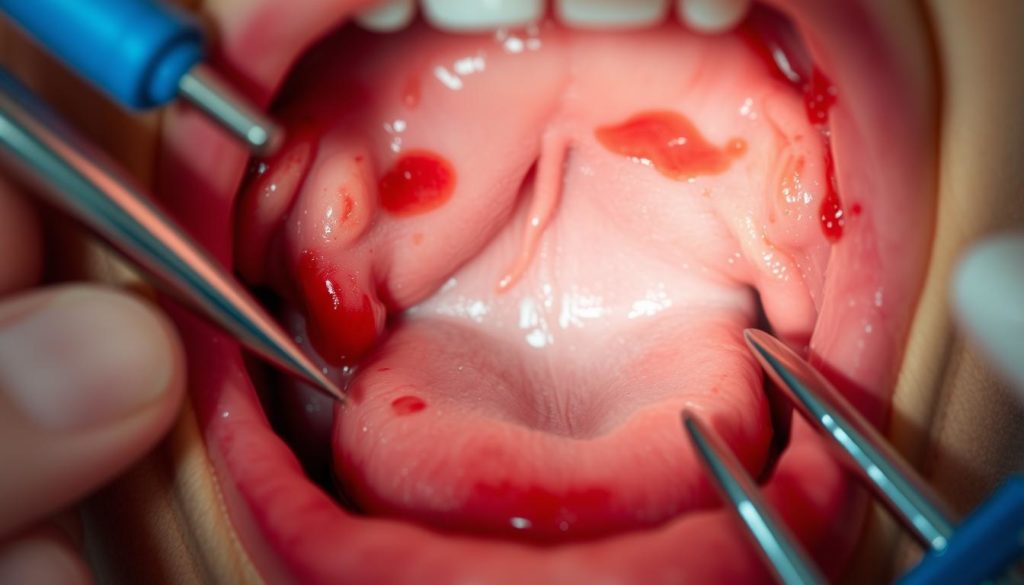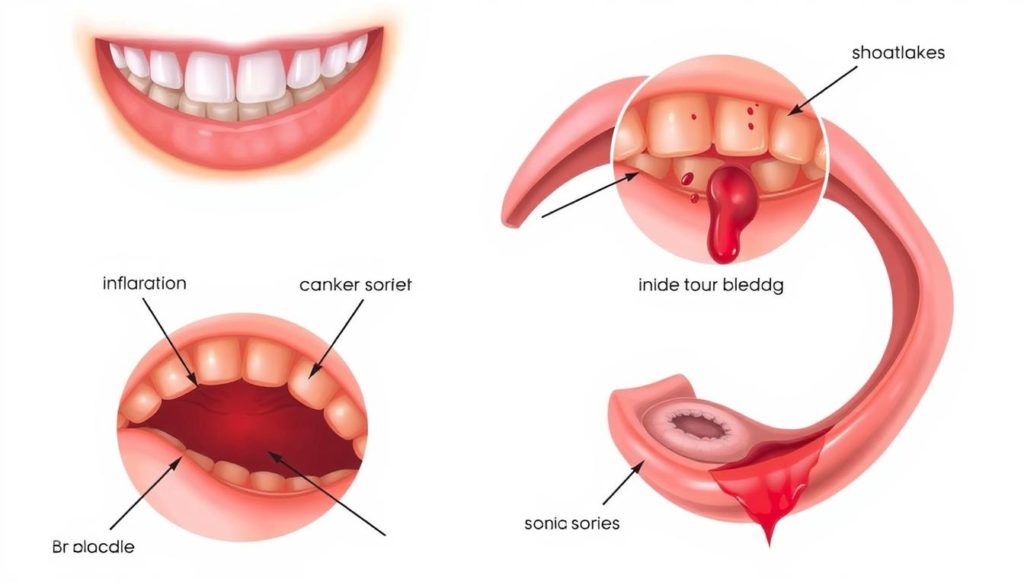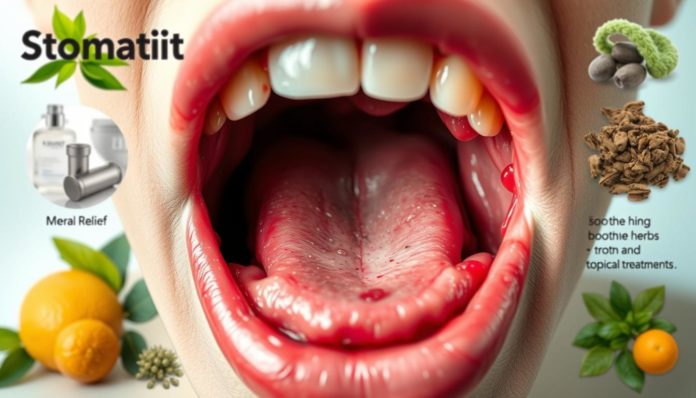Did you know about 20% of people get mouth ulcers and inflammation? This issue, called stomatitis, can really affect one’s mouth health. It makes eating and speaking hard.
Stomatitis includes different kinds of mouth sores and inflammations. It’s crucial to know why it happens and how to find relief. This guide will show you what causes mouth sores. It will also give practical tips to manage and avoid this common problem.
What is Stomatitis?
Stomatitis is a common health issue. It causes inflammation and soreness in the mouth. This makes the mouth’s mucosal tissues swollen, leading to pain and discomfort.
Definition and Overview
The term stomatitis definition covers various oral inflammations. It leads to mucosal ulcers, painful sores in the mouth lining. Such conditions affect eating, speaking, and oral hygiene, lowering life quality.

Types of Stomatitis
Knowing the types of stomatitis helps in treatment. The main types are:
- Aphthous Ulcers: These are canker sores. They appear as small, shallow lesions inside the mouth.
- Herpetic Stomatitis: Caused by the herpes virus, it leads to painful ulcers.
- Angular Cheilitis: Affects mouth corners, making them cracked and sore. It can lead to infections.
Each stomatitis type presents unique symptoms and needs specific treatments. Correct diagnosis is key for relief.
| Type | Causes | Symptoms |
|---|---|---|
| Aphthous Ulcers | Unknown, maybe an immune response | Small, painful sores inside the mouth |
| Herpetic Stomatitis | Herpes simplex virus | Multiple ulcers, fever, swollen gums |
| Angular Cheilitis | Bacterial/fungal infection, nutrition deficiency | Sore, cracked mouth corners |
Common Symptoms of Stomatitis
It’s important to spot stomatitis symptoms early for proper treatment. This condition is common and quite uncomfortable. Being aware of the main signs helps you get fast care.

Physical Signs
Stomatitis often shows physical signs first. Look for:
- Redness in the mouth
- Blisters and sores on the inner cheeks, gums, or tongue
- White patches or lesions
Spotting these symptoms is easy and should be a priority. Early detection of these signs can prevent serious issues later on.
Pain and Discomfort
Pain and discomfort often accompany stomatitis. You may feel:
- A persistent burning sensation in the mouth
- Sensitivity to hot, spicy, or acidic foods
- Difficulties in talking or swallowing
If you notice these symptoms, they can make daily tasks hard. Talk to a doctor to control these issues effectively.
Causes of Stomatitis
Knowing the causes of stomatitis helps people avoid this sore condition. Let’s look into what can cause stomatitis.
Infections
Infections are a top reason for stomatitis. Stomatitis infections come from bacteria, viruses, or fungi. These germs attack the mouth’s lining, causing ulcers or sores that hurt a lot.
Injuries
Physical harm or oral injuries often lead to stomatitis. Things like biting your cheek by accident, dentures that don’t fit right, or brushing too hard can make sore spots. These can turn into painful ulcers if the mouth is injured over and over.
Allergies
Allergies in the mouth play a big role too. Some people react badly to certain foods, dental stuff, or medicines. These reactions cause swelling and soreness, making stomatitis more likely.
Underlying Medical Conditions
Health problems can also make stomatitis a regular issue. Diseases like lupus or Crohn’s disease lead to ongoing mouth sores. This happens when the immune system wrongly targets the body’s own cells.
Treatment for Stomatitis
Stomatitis might make you feel uncomfortable, but you can find relief. There are many treatments available to ease symptoms and speed up healing. Learning about these treatments helps in managing the condition well.
Medications
Firstly, medications play a key role in treatment for stomatitis. You can use over-the-counter remedies, like topical anesthetics or antiseptic mouth rinses, for quick relief. If it’s serious, your doctor may suggest corticosteroids or antiviral medications. These help reduce swelling and fight infections.
Home Remedies
Home remedies for oral ulcers also offer comfort. Try rinsing with saltwater or applying honey. Staying hydrated is important. To avoid more irritation, skip spicy and acidic foods. Together, these steps help in your recovery.
When to See a Doctor
If your symptoms last over two weeks or get worse, see a doctor. This is also true if you have a high fever or trouble swallowing. A doctor can provide specific treatments and check for other health issues.
Preventing Stomatitis
Maintaining good oral hygiene, avoiding triggers, and eating a healthy diet are key to prevent stomatitis. These steps help lower the risk of this painful oral condition.
Good Oral Hygiene
To prevent stomatitis, practice excellent oral hygiene. Brush and floss regularly, use antiseptic mouthwash, and see your dentist often. These actions remove food and plaque, preventing infections that lead to stomatitis.
Avoiding Triggers
Understanding and avoiding stomatitis triggers is crucial. Stay away from certain foods, stress, and tobacco products. Being careful about these can help prevent stomatitis.
Healthy Diet
A balanced diet supports oral health. Eat foods high in vitamins A, C, E, and folic acid. A healthy diet strengthens your mouth’s defense against infections, helping prevent stomatitis.
Natural Relief Options for Oral Ulcers
Many people with painful oral ulcers look for natural ways to feel better. They want to heal using herbs and changing what they eat. These methods are kind and work well without needing regular medicine.
Herbal Remedies
Herbs can really help with mouth sores. Chamomile and sage are especially good because they reduce swelling and pain.
- Chamomile: Chamomile tea or a rinse can calm sores, bringing down pain and swelling.
- Sage: With its ability to fight bacteria and reduce swelling, sage is great for oral ulcers. A sage rinse offers quick relief.
Using these herbal remedies can speed up your recovery. They are safe and free from harsh chemicals.
Dietary Changes
What you eat is very important when you have stomatitis. The right foods can lessen irritation and help sores heal faster:
| Foods to Include | Foods to Avoid |
|---|---|
| Soft, easy foods like yogurt, bananas, and avocados | Spicy, acidic, or salty foods that can make ulcers worse |
| Cool treats like ice cream and smoothies | Hard foods like chips or nuts |
| Foods full of Vitamin B and iron like spinach and grains | Hot drinks and foods that might hurt more |
Changing what you eat is a smart move. A good diet helps your mouth heal and keeps it healthy.
When to Seek Professional Help for Mouth Sores
Stomatitis and mouth sores are issues many face. Knowing when to seek professional help is key. Signs like persistent discomfort, severe pain, or difficulty eating should send you to a dentist or healthcare provider.
There are clear signs that you need medical advice for mouth sores. Among them are sores that don’t heal after two weeks, unbearable pain, or frequent occurrences. Also, if eating becomes hard or you see signs of infection like fever, it’s time to get help.
Spotting these signs early is crucial for your oral health. It ensures you get the right treatment quickly. This leads to better wellbeing and a happier mouth.
Dietary Advice for Stomatitis Sufferers
Dealing with stomatitis means being careful about what you eat. Some foods can make mouth sores worse, while others help them heal faster. Here are some tips on what to eat and avoid for a stomatitis diet, aiming at comfort and quicker recovery.
Foods to Avoid
It’s crucial to stay away from foods that can irritate mouth sores. Here’s what to avoid:
- Spicy foods: Things like chili peppers, hot sauces, and spicy curries can make mouth sores sting.
- Acidic foods: Citrus fruits such as lemons, oranges, and grapefruits can make sores worse.
- Salty foods: Snacks that are high in salt, like chips and pretzels, can irritate your mouth.
- Hard or crunchy foods: Eating nuts, seeds, and crusty breads can harm mouth sores more.
Nutritious Alternatives
Choosing foods that help heal mouth sores can speed up your recovery. Here are some better choices:
- Soft, bland foods: Foods like mashed potatoes, oatmeal, and scrambled eggs are soft and gentle.
- Non-citrus fruits: Eating applesauce, bananas, and melons won’t irritate your mouth.
- Yogurt: This food is full of probiotics which help your gut and soothe your mouth.
- Cooked vegetables: Vegetables such as steamed or boiled carrots, spinach, and squash are full of vitamins and easy to eat.
Here’s a quick comparison of what foods to avoid and what foods can help heal mouth sores:
| Foods to Avoid | Nutritious Alternatives |
|---|---|
| Spicy foods (e.g., chili peppers) | Soft, bland foods (e.g., mashed potatoes) |
| Acidic foods (e.g., lemons) | Non-citrus fruits (e.g., applesauce) |
| Salty foods (e.g., chips) | Yogurt |
| Hard or crunchy foods (e.g., nuts) | Cooked vegetables (e.g., steamed carrots) |
Lifestyle Adjustments to Minimize Stomatitis Recurrence
Making some changes in your life can really help with mouth ulcers. A big one is to handle stress better. When you’re stressed, your immune system gets weaker. This makes you more likely to get sores in your mouth. Try to relax by doing things like meditation, yoga, or walking outside.
Avoid smoking and drinking too much alcohol. They can make your mouth sore and worsen stomatitis. By quitting smoking and drinking less, you’ll not only feel better but also get fewer mouth ulcers. If quitting is hard, get help from a doctor or a support group.
Think about how your surroundings affect your mouth’s health. Dry air and certain chemicals can irritate your mouth. Use a humidifier, choose products that won’t cause allergies, and keep your home clean. These steps will not only help your mouth feel better but also improve your health overall.
FAQ
What causes stomatitis?
Many things can cause stomatitis. These include infections, injuries, allergies, and certain medical conditions. Infections can be bacterial, viral, or fungal. Injuries could come from dental appliances or bites, and allergies can be from foods or dental products. Diseases like lupus may also play a role.
What are the symptoms of stomatitis?
Stomatitis symptoms include redness, swelling, and mouth sores or ulcers. It can hurt, making it tough to eat or talk. Some might feel a burning sensation or find certain foods too painful.
How is stomatitis diagnosed?
Doctors diagnose stomatitis by looking inside your mouth and checking your medical history. Sometimes, they need extra tests like blood work or mouth swabs to find the cause.
What are the treatment options for stomatitis?
Treatment might involve drugs you can buy without a prescription, prescribed medications, and home care. This could mean using special mouthwashes, gels, and painkillers. Doctors might prescribe medicine for viruses, fungi, or bacteria. Natural remedies include rinsing with salt water or baking soda.
Can stomatitis be prevented?
Preventing stomatitis is possible with good oral care and by avoiding triggers. Brushing, flossing, steering clear of irritating foods, and reducing stress can help.
When should I see a doctor for mouth sores?
See a doctor if sores don’t heal in two weeks, cause a lot of pain, or come with fever or trouble swallowing. These could be signs of something more serious. Getting a doctor’s help is important.
Are there natural remedies for relieving oral ulcers?
Yes, for oral ulcers, try herbs like chamomile, sage, and licorice root. Changing what you eat can also ease pain. Avoiding harsh foods and choosing gentle, bland ones works well. Staying hydrated and using natural rinses like honey can soothe ulcers, too.
How can diet affect stomatitis?
What you eat is crucial in dealing with stomatitis. Certain foods, especially spicy, salty or acidic ones, can make it worse. Eating healthy foods rich in vitamins and staying away from allergens might help. It can speed up healing and boost your mouth health.
What lifestyle adjustments can help minimize the recurrence of stomatitis?
To reduce stomatitis flare-ups, consider some lifestyle tweaks. Manage stress and avoid harmful habits like smoking and heavy drinking. Watch out for things that trigger your stomatitis, like certain foods or poor dental hygiene. Regular dentist visits and staying hydrated are important too.


